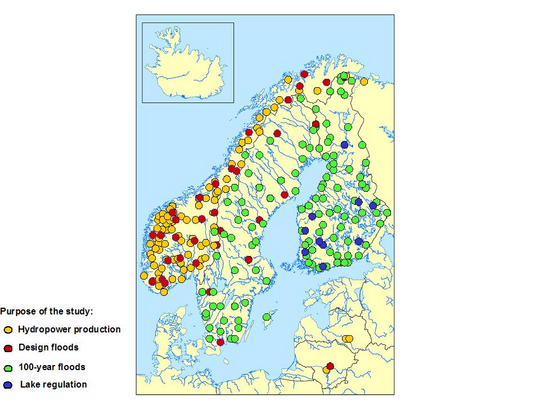Focus of the Hydropower-Hydrology group of CES
Hydropower is the most important renewable energy source for electricity in the Nordic area. It is therefore of great interest to analyse the possible impacts of climate change on both the future production and the safety of the system. This is the aim of the Hydropower-Hydrology group of CES. The work is a continuation of the activities within its predecessor, the Climate and Energy project. The new focus of the Hydropower-Hydrology group of CES can be summarized as follows:
- The focus on hydropower production and dam safety is maintained
- New and more diversified climate scenarios with shorter time horizon are used
- The model interface between climate models and hydrological models will be improved
- Uncertainties will be explored further
- Improved methodology to cope with impacts of lake regulation in a changing climate will be developed
- More detailed dam safety analyses will be carried out as comparative design studies between nations
- A more intense user dialogue will be developed
Partners
The work of the Hydropower-Hydrology group of CES is carried out by a network of scientists mainly from the national institutes. Thus a wide range of aspects of hydropower and natural conditions are covered, from the glaciated basins in Iceland and Norway, through the big Finnish and Swedish lakes, to the big rivers in Latvia and Lithuania. The following institutes participate in the Hydropower-Hydrology group of CES:
- The Finnish Environment Institute
- The Icelandic Meteorological Office
- The Icelandic National Energy Authority
- The Latvian Environment, Geology and Meteorology Agency
- The Lithuanian Energy Institute
- The Norwegian Water Resources and Energy Directorate
- The Swedish Meteorological and Hydrological Institute
Test Sites
The national contributions to CES vary between the countries, depending on specific interests and differencies in natural and societal conditions.The work of CES also relies heavily on the output from national research programmes. Most of the work is carried out in a number of test basins, where various aspects of climate change and hydropower are being studied. The map illustrates the distribution and focus of the studies at these sites.

Methods
Regional climate scenarios for the period up to 2050 are the foundation for the work. They are provided as a matrix of model output by the Climate Modelling and Scenarios group of CES. A link to the European ENSEMBLES project is established via the Rossby Centre of SMHI. The climate scenarios are processed through hydrological models to arrive at simulations of changes of river flow or inflow to the reservoirs of the hydropower system in a changing climate. The use of a matrix of several climate scenarios makes it possible to carry out uncertainty analyses.
For dam safety analysis the possible impacts of climate change on the floods computed according to the national guidelines for design studies are analysed. Comparative studies of design floods in a changing climate with different national guidelines will also be carried out in border rivers between Norway and Finland and between Norway and Sweden. The rules for the regulation of lakes and rivers may become obsolete in a changing climate. This effect and possible adaptation strategies is also studied by the group, in particular with contributions from Finland.
Glacier modelling is developed in co-operation with the Hydropower-Snow and Ice group of CES. Output from the Hydropower-Hydrology group of CES will be delivered to the groups for Energy Systems and Risk Assessment for further analysis.
A user-dialogue is carried out with the hydropower industry. This is obtained by contributions to designated conferences and the participation in working groups related to impacts of climate change on the hydropower system of respective country.
The Hydropower-Hydrology group of CES meets twice every year to follow-up deliverables and share results and experience.
Here is a full PDF version of the Hydrology, Hydropower Flyer
For further information, contact
Sten Bergström sten.bergstrom@smhi.se



